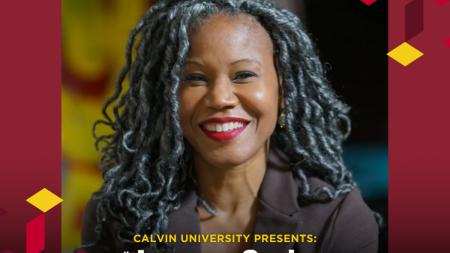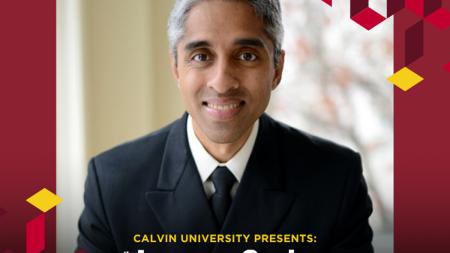Honoring Work in Worship

As a coauthor of the new book Work and Worship: Reconnecting Our Labor and Liturgy, Calvin Theological Seminary professor Cory Willson said he learned from the insight of a high school principal who had had an especially hard week.
As part of the research he conducted in the past several years for a Ph.D. at Fuller Theological Seminary, Willson interviewed 80 workers in three cities, including that high school principal, to ask about the connection they experienced between their religious faith and the work they did.
The high school principal had had “a huge tragedy at the school. He had been ‘putting out fires’ all week. And I asked him what worship meant to him in light of what happened,” said Willson, who wrote the book with Matthew Kaemingk of Fuller Seminary.
“The principal told me that when he was in worship, he slowly began to process the trauma he had experienced that week,” said Willson. “He was able to bring his lament and loss into worship.”
Out of this comes a core message of the book.
“If the sanctuary is formative, then things that have happened during the week must be brought into the space of gathered worship,” said Willson. “You do not set those things aside, even during [a pandemic].”
Another theme of the book explores how you can inhabit the liturgy more faithfully, said Willson. “You can engage in the practice of bringing your work and offering it up to God. . . .”
On Nov. 12, the Presidents’ Legacy Society of Calvin Seminary hosted the virtual event marking the release of the book.
And the Englewood Review of Books describes the book this way: "Drawing on years of ministry, teaching, and leadership experience, the authors explain that our Sunday worship and our Monday work desperately need to inform and impact each other.”
Kaemingk said churches could do more to recognize and honor the vocations of the people in their congregations. When he was a youth and his family went to church, he said, “we prayed for missionaries and watched as they laid hands on youth groups going away on mission trips.”
Kaemingk’s mother was a nurse and his father was a carpenter “who made houses for people to flourish in,” he said. “But never did anyone ask them to come forward to have hands laid on them and to send them forth to work” in the hospital or to build homes and cabinetry.
“We can ask, ‘What vocations are blessed in worship?’ All vocations matter. But the liturgy in my parent’s church didn’t reflect that.”
For a time, Kaemingk served with the Center for Faith and Work at Redeemer Church in New York City. In that role, he said, he had the chance to sit regularly with and to hear the stories of stockbrokers, artists, writers, retail workers, and others.
“I heard stories of great praise and victory,” he said, and he felt a calling to find ways to bring those stories of “God-lived lives” into weekly worship, where people’s vocations, with all their joys and sorrow, could be held up and celebrated.
One way in which he has been able to do this, Kaemingk added, is by delving deeply into Scripture to see how the Bible addresses work. In researching the book, he said, “We found something deeply old — work and worship are strongly connected in the Old Testament. People take up their work and lift it up to God.”
They found a similar theme in the New Testament, where people bring “the work of their harvest for blessing before God,” Kaemingk said.
Unfortunately, work and worship have become separated in our world today. We can attend services on Sunday and, without the work we do being blessed, go out to live the rest of our life, he said. This makes for a stark and in many ways a painful split between the sacred and the secular.
“God didn’t make us to live separate lives,” said Kaemingk. “Worship has in many cases become a time to pretend, a time of spiritual escape. It is as if what happens in your daily life never happened or doesn’t matter.”
An opportunity to link work and worship is at the Lord’s table, where bread and wine, the work of human hands, are used to recall the life and death and resurrection of Jesus, said Willson.
“The work of people can be declared good in worship and given back to them,” he said.
In their book, the authors also make the point that the concept of the priesthood of all believers is crucial. The places in which we work and live are our parish.
Everyone is connected; everyone is significant; everyone has gifts given them to honor God and others. Whether your work involves taking care of your children at home or being a heart surgeon, whether it includes driving for Uber or volunteering at a food bank, it is worthy of God’s attention and can be infused with grace.
“Take the identity of your work very seriously” so that your own personal experiences and actions can be incorporated into “your own process of gathered worship,” said Willson. “You may not like the parish you are placed in, but you are there for a purpose.”
The authors suggest ways in which churches can celebrate workers: Have people take photos of themselves at work, and then project them on a screen during prayer time in the worship service. Bring forward people involved in any number of occupations in order to pray over them and lay hands on them.
In addition, said Willson, there are many good songs about work and positive spiritual formation. People can also write prayers and liturgies for worship.
In the end, said Willson, “Give affirmation to people that their work matters; help to expand what God’s kingdom can look like in this area.”


